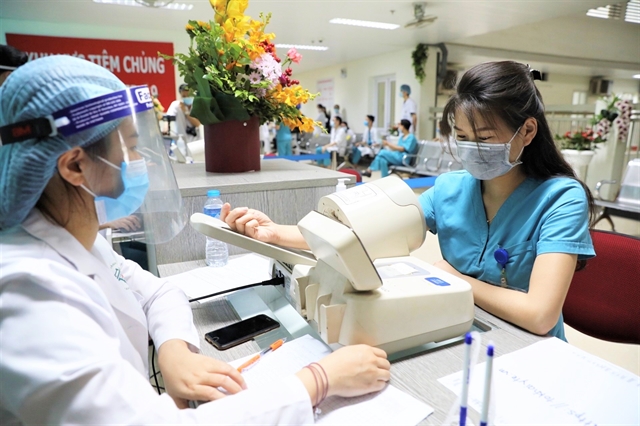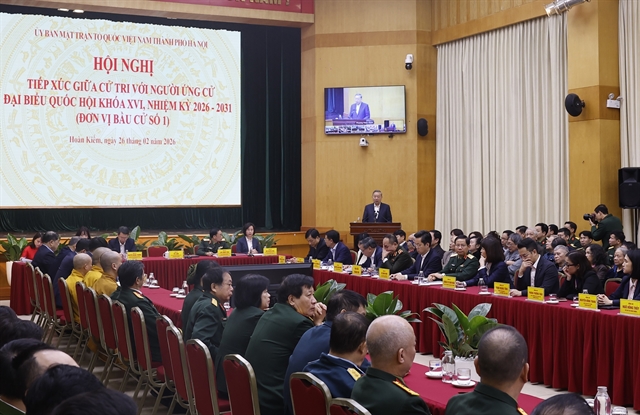 Society
Society


|
| As per health ministry's guidelines, a medical worker at Thanh Nhàn Hospital in Hà Nội underwent a medical checkup before receiving the COVID-19 vaccine. — VNA/VNS Photo Minh Quyết |
HÀ NỘI — The health ministry has sent urgent notice requesting all 63 provinces and cities in the country quickly make a list of all people eligible for free COVID-19 vaccinations.
The eligible people are within the 10 priority groups detailed in the Government’s Decree 21, including frontline workers (medical workers, COVID-19 steering committees, police and military forces directly involved in the fight against the pandemic); Vietnamese diplomats and relatives sent on overseas missions and diplomatic delegations and UN representative offices in Việt Nam; customs, exit and entry officers; essential service workers (utility, airlines, transport, tourism, etc.); teachers and education institution’s staff or those working at front-facing administrative offices; people with chronic diseases; the elderly (above 65 years old); people in COVID-19 outbreak areas; poor people and social welfare beneficiaries; people authorised by the State to work or study overseas.
The list of eligible people in each group must be submitted to the Ministry of Health’s General Department of Preventive Medicine and regional Pasteur institutes before April 15, for the ministry to build a plan on distribution of vaccines and future phases in the implementation of the vaccination drive.
According to Wednesday’s report from the National Expanded Programme on Immunisation, as of 4pm Tuesday, 53,953 people – mostly frontline workers in 19 provinces and cities in the country – have been given Oxford/AstraZeneca COVID-19 vaccine shots from the 117,600 doses ordered from the company that arrived on February 24 this year.
COVAX Facility, the global vaccine sharing scheme, on April 1 delivered more than 800,000 doses of the Oxford/AstraZeneca vaccine to the country.
“This is the first of several shipments, with a total of 4.1 million doses still predicted to arrive by the end of May, including this first instalment, with subsequent shipments after May reaching towards our 20 per cent of the population target by the end of 2021,” Kamal Malhotra, UN Resident Coordinator in Việt Nam, said at the handover ceremony of the vaccine batch to the National Institute of Hygiene and Epidemiology.
“Global supply chain challenges make firm delivery dates and amount difficult to predict in advance – but COVAX remains confident that it will deliver up to 20 per cent of population equivalent doses by the end of this year to every eligible country,” he noted.
He also warned that the ‘clock is ticking’ on health ministries across the world to get the doses to surmount the ‘logistical challenges’ to get the vaccine to the people as the shelf life of the vaccine is only six months, while recognising that each person must be given two vaccinations two to three weeks apart.
Việt Nam’s health authorities said they have about 60 million doses of COVID-19 vaccines in 2021, 30 million from commercial order from AstraZeneca along with 30 million from COVAX, while talks are still ongoing for Russia’s Sputnik V, US-made vaccines like Moderna or Pfizer, etc.
Domestic vaccines
Amid a global shortage, other than foreign supplies, Việt Nam is also betting on its locally developed COVID-19 vaccines, with two – Nano Covax by Nanogen company and COVIVAC by the Institute of Vaccines and Medical Biologicals (IVAC) – already in human trials.
All 551 people who have been administered two doses of Nano Covax in second-phase human trials – 280 in Long An Province, 271 in Hà Nội, including Deputy Prime Minister Vũ Đức Đam (nine more are scheduled to receive the second jab later this week) – all report normal health. Some typical post-injection symptoms like local aches or muscle pains disappeared quickly.
Phase 3 trials are expected to start in May, and experts are optimistic that phase 3 could conclude by the end of third quarter this year.
COVIVAC started phase 1 of human trials on March 15 and to date, 66 volunteers have been administered the first shot, with another 54 volunteers set to receive the jab by April 18.
No abnormal reactions have been recorded, and haematological and biochemical tests have shown nothing out of order.
With the window between two shots determined to be 28 days, starting April 12, the second shots will be given for the first six volunteers. — VNS




